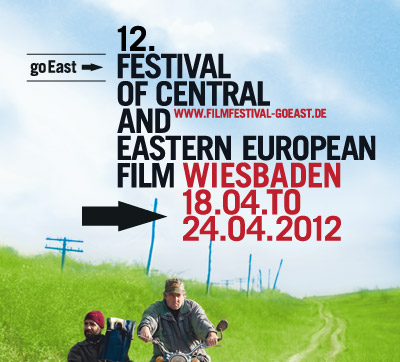« Vive le Jury! (IV) | Home | Schilf – Alles, was denkbar ist, existiert. »
GoEast Symposium: RealAvantGarde – With Lenfilm Through the Short 20th Century
By admin | April 11, 2012
The 2012 goEast Symposium in Wiesbaden (April 19-22, 2012) departs from the pattern established in previous years: instead of covering a theme with general relevance for Central and Eastern Europe, this year’s Symposium focuses on a single national institution: Lenfilm, the first film studio to be set up in the USSR.
Lenfilm recently returned to the headlines after plans were announced to liquidate (in other words, privatize) the studio and public protests came from the internationally renowned directors Aleksandr Sokurov und Aleksei German. Some insist that the studio is (still) alive, pointing to the impressive total of 1,500 productions since 1918. Lenfilm’s day is over, argue others, saying the once-grand institution symbolizes the USSR’s decline as a cinematic power.
From the 1920s up to the final phase of perestroika, Lenfilm provided a space inside which avant-garde cinema, genre film and artistic ambition influenced and enriched one another. Driven by creativity and the pioneering spirit, Lenfilm repeatedly broke new ground. In conjunction with the on-going re-assessment of figures and productions associated with the studio, recent discoveries of films previously thought to be lost suggest that the history of Lenfilm is far from complete. At times it seems we are only beginning to catch up.
RealAvantGarde – With Lenfilm Through the Short 20th Century proves that film history must be viewed as a work-in-progress, as a fleeting construct shot through with ruptures. Lenfilm emerges as a point of confrontation for very diverse disciplines, a studio open in equal measure to the compositions of Shostakovich, to the synthetic sound techniques of Sholpo, to the master animator Tsekhanovsky’s experiments with colour and objects, to the manifold forms of historical knowledge and the handling (and manipulation) of the same. Whether dealing with the wars, nimbly juggling genre-topoi (science fiction, thrillers and musicals were always welcome), or establishing alternative forms of (sur)realism, Lenfilm proved capable of linking the avant-garde up to day-to-day life. Lenfilm is history in serialized form.
The Symposium, curated by Barbara Wurm (Berlin) and Olaf Möller (Cologne), includes a panel discussion on ›Lenfilm now & then‹, and lectures by Russian film directors (Oleg Kovalov and Svetlana Proskurina), film historians (Petr Bagrov and Sergei Kapterev), the British book author John Riley and Austrian film critic Christoph Huber. The line-up consists of 13 programs and more than 25 films. Acclaimed masterpieces like Fridrich Ermler’s Fragment of an Empire (1929) or Aleksandr Sokurov’s Days of Eclipse (1988) are shown side by side with the sci-fi classic Amphibian Man (1961) or Oleg Kovalov’s Perestroika-experiment The Scorpion’s Gardens (1991), a pre-thaw- (Heifitz’ A Big Family, 1954) and a post-thaw-monument (Ermler’s Facing the Judgement of History, 1965), the DEFA-coproduction Schwarzer Zwieback (1971) and the Germany related Cities and Years (1930), two wonderful essays in realism, Ilya Averbakh’s Monolog (1972) and Proskurina’s Playground (1986), and, last but not least, cult films of their time, like Kozintsev/Trauberg’s Yunost’ Maksima (1934) or Igor Maslennikov’s Sherlock Holmes-series (The Twentieth Century Approaches, 1981). Not to be missed: ›Animation on the move‹ – short film rarities by Mikhail Tsekhanovsky and others. – ed.
Topics: International Reports, KINO #102 Berlinale 2012 Issue | Comments Off on GoEast Symposium: RealAvantGarde – With Lenfilm Through the Short 20th Century
Comments are closed.

